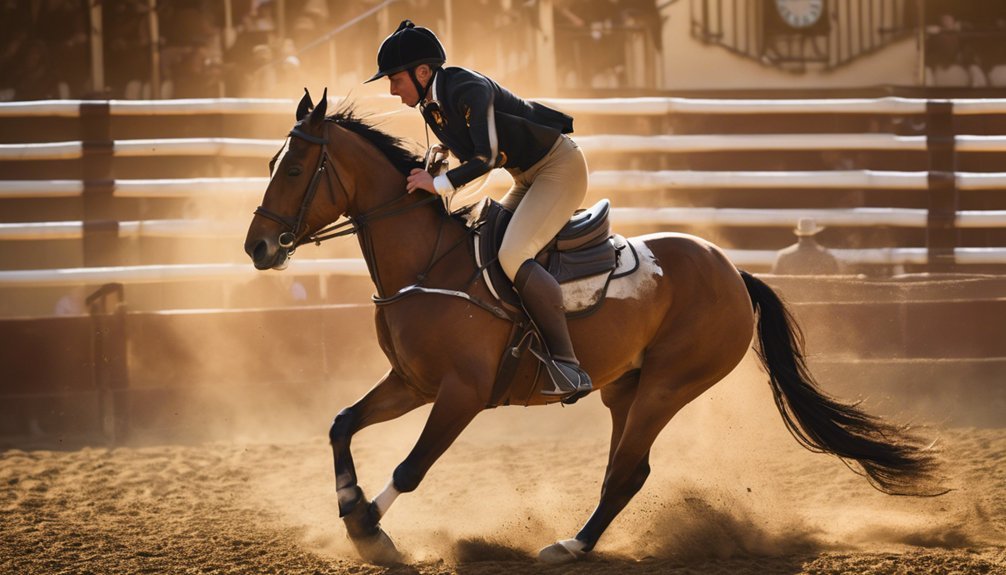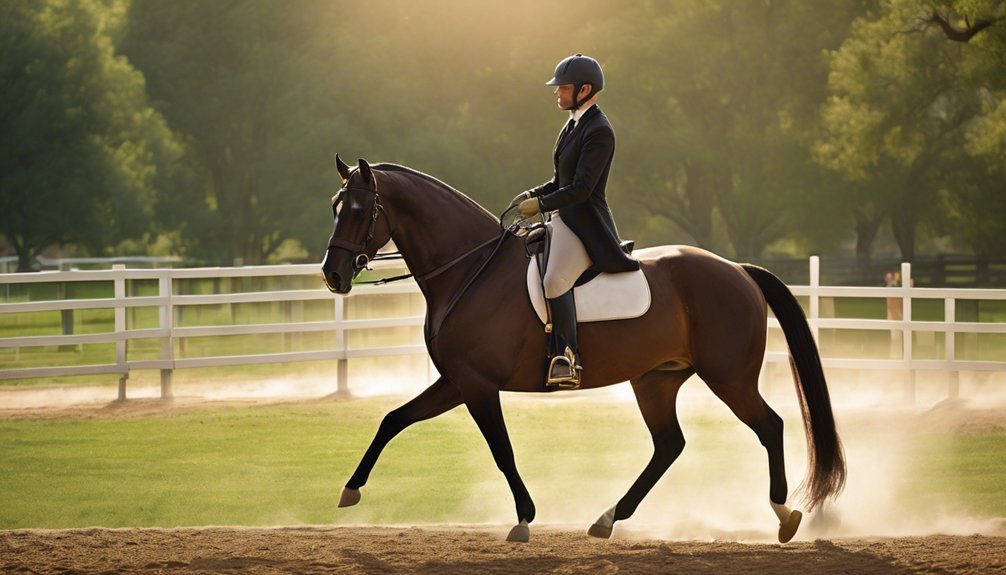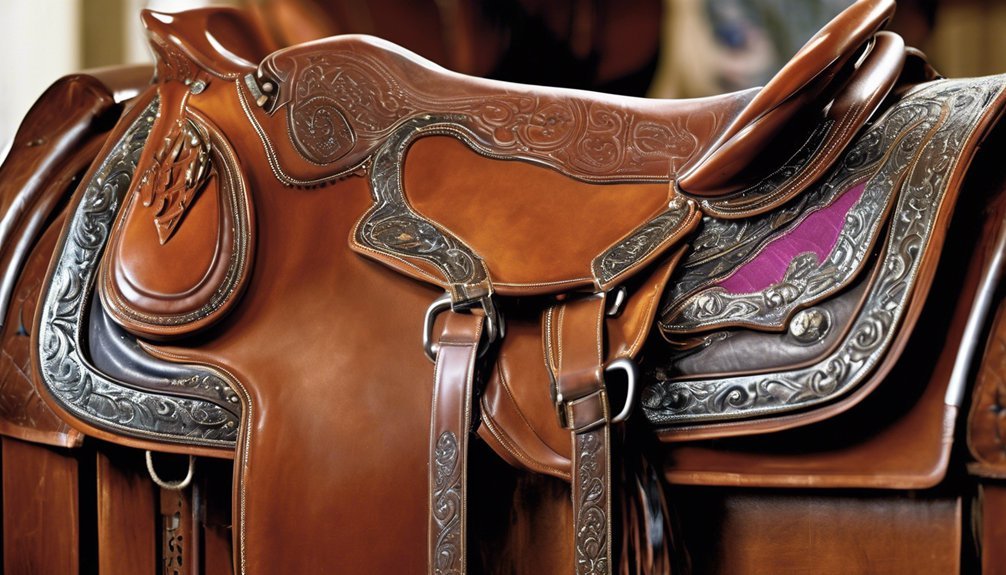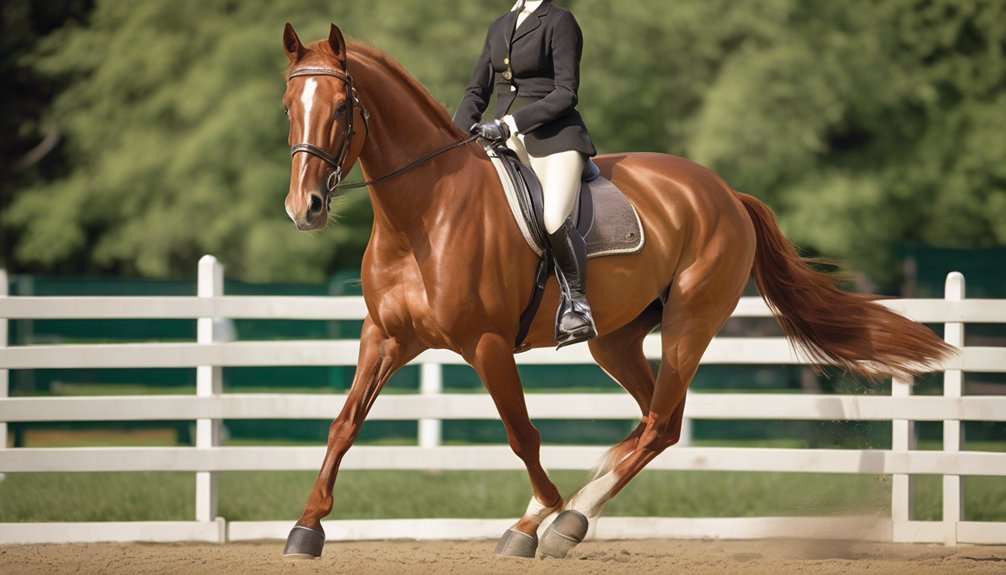
In competitive riding, it's easy to overlook some essential training aspects that can make or break your performance. You might be skipping warm-ups or neglecting your own fitness, which affects your horse's responsiveness. Consistency in training is vital, yet it's often disregarded. Have you thought about how mental preparation and post-ride care fit into the equation? Let's explore these common pitfalls and how addressing them can elevate both you and your horse to new heights.
Key Takeaways
- Neglecting proper warm-ups can lead to poor horse performance and increased injury risk.
- Overlooking rider fitness reduces control and balance, negatively impacting horse responsiveness.
- Inconsistent training routines hinder progress and cause frustration in both rider and horse.
- Ignoring mental preparation can diminish confidence and focus during competitions.
- Skipping post-ride care affects horse well-being and recovery, impacting future performance.
Neglecting Proper Warm-Ups

While it might be tempting to skip warm-ups in favor of getting straight to the action, neglecting this crucial step can significantly impact your horse's performance and overall well-being.
A proper warm-up duration typically ranges from 15 to 30 minutes, depending on your horse's fitness level and the intensity of the workout ahead. Incorporating effective warm-up techniques, like gentle stretching and gradual increases in pace, helps prepare your horse physically and mentally.
These moments strengthen your bond and promote trust, making your partnership more effective. Remember, it's about more than just getting ready; it's about ensuring your horse feels valued and cared for.
Overlooking Rider Fitness
After ensuring your horse is warmed up and ready, it's easy to focus solely on their readiness and overlook your own fitness. However, your performance as a rider greatly depends on your strength and endurance.
Building rider strength isn't just about looking good; it enhances your control and balance while riding. Incorporating endurance training into your routine can improve your stamina, allowing you to stay engaged and alert throughout long rides or competitions.
Remember, a fit rider leads to a more responsive horse. By prioritizing your physical condition, you not only elevate your own skills but also strengthen the bond with your horse.
Embrace the journey of fitness together and you'll both thrive in the competitive arena.
Inconsistent Training Routines
Inconsistent training routines can undermine your progress and lead to frustration, as both you and your horse need structured practice to reach your competitive goals. Unpredictable schedules and a lack of discipline can derail your efforts. Instead, aim for consistency by establishing a clear training timetable that fits your lifestyle.
| Day | Training Focus | Duration |
|---|---|---|
| Monday | Dressage Techniques | 1 hour |
| Wednesday | Jumping Drills | 1.5 hours |
| Friday | Trail Riding | 2 hours |
Ignoring Mental Preparation

Mental preparation is often overlooked, yet it plays a crucial role in your success as a competitive rider. You might focus on physical skills, but without mental visualization and effective stress management, your performance can falter.
Picture your rides in vivid detail; see yourself navigating jumps, maintaining rhythm, and staying calm under pressure. This mental rehearsal builds confidence and familiarity, helping you tackle challenges with ease.
Incorporate stress management techniques like deep breathing or mindfulness into your routine. These practices ground you, allowing you to focus better during competitions.
Focusing Solely on Competition
While mental preparation sets a strong foundation, many riders get caught up in the competition mindset, focusing solely on upcoming events.
This narrow focus can lead to neglecting essential aspects of your training balance, like skill development and horse care.
Remember, it's not just about winning; it's about growing as a rider and partner to your horse. Embrace the journey, and allow yourself the space to experiment and learn.
Incorporating varied training activities can enhance your performance while deepening your connection with your horse.
Celebrate small victories and cultivate a community with fellow riders who share similar goals.
Skipping Post-Ride Care
Although you may feel tempted to wrap up your training session and head home, skipping post-ride care can significantly impact your horse's well-being and performance.
Prioritizing post-ride recovery is essential for maintaining a healthy and happy partner. Here's what you shouldn't overlook:
- Cooling down: Gradually reduce your horse's intensity to prevent injury.
- Hydration: Ensure your horse drinks enough water to replenish fluids lost during exercise.
- Grooming: Remove sweat and dirt to promote skin health and bonding.
- Nutrition: Provide a balanced post-ride meal to aid recovery.
Embracing these horse care practices not only enhances performance but also fosters a deeper connection with your horse.
Frequently Asked Questions
How Can I Create a Balanced Training Schedule?
To create a balanced training schedule, prioritize time management and ensure training consistency. Set specific goals, mix intensity levels, and adjust as needed. You'll foster improvement while nurturing your passion and connection to the sport.
What Are Effective Relaxation Techniques for Riders?
So, you think mastering the art of relaxation is as easy as a Sunday stroll? Try breathing exercises and visualization techniques instead. They'll transform your tension into tranquility, making you feel like a true equestrian!
How Often Should I Assess My Horse's Fitness?
You should assess your horse's fitness regularly, ideally every few weeks, to ensure their conditioning program remains effective. This ongoing evaluation helps you adjust training, keeping your horse healthy and ready for competition.
What Nutritional Changes Can Improve Rider Performance?
To boost your performance, focus on optimizing carbohydrate intake for energy and adopt effective hydration strategies. Staying fueled and hydrated helps you maintain stamina and focus, ensuring you're always at your best in competition.
How Can I Stay Motivated During Off-Season Training?
Did you know that 80% of people achieve their goals when they share them? Set clear goals and find accountability partners to keep you motivated during off-season training. You're not alone; support makes a huge difference!
Conclusion
In the dance between rider and horse, every misstep can disrupt harmony. By embracing warm-ups, prioritizing your fitness, and maintaining a consistent routine, you're not just training; you're building a partnership that soars. Remember, the quiet moments of mental preparation and post-ride care are the gentle whispers that nurture this bond. As you refine your practices, you'll unlock the true potential within both you and your horse, allowing you to gallop toward success with confidence and grace.





